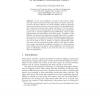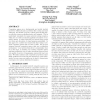54 search results - page 10 / 11 » Complexity Results about Nash Equilibria |
AI
2006
Springer
15 years 3 months ago
2006
Springer
So far, most equilibrium concepts in game theory require that the rewards and actions of the other agents are known and/or observed by all agents. However, in real life problems, a...
104
click to vote
CSFW
2008
IEEE
15 years 6 months ago
2008
IEEE
In various settings, such as when customers use the same passwords at several independent web sites, security decisions by one organization may have a significant impact on the s...
P2P
2007
IEEE
15 years 6 months ago
2007
IEEE
We develop a model of the interaction of rational peers in an incentive-free Peer-to-Peer (P2P) network and use game theoretic analysis to derive results about peer and network be...
104
click to vote
WINE
2009
Springer
15 years 6 months ago
2009
Springer
Congestion games are a fundamental and widely studied model for selfish allocation problems like routing and load balancing. An intrinsic property of these games is that players ...
HICSS
2003
IEEE
15 years 5 months ago
2003
IEEE
We adopt the decision-theoretic principle of expected utility maximization as a paradigm for designing autonomous rational agents operating in multi-agent environments. We use the...


